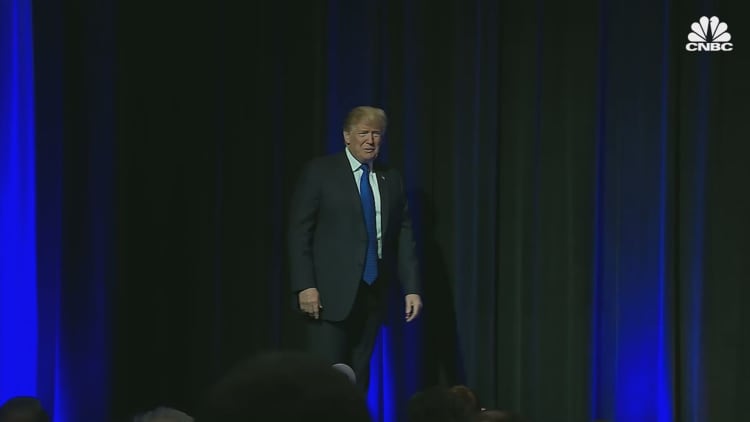
President Donald Trump on Thursday unveiled the first overhaul of American missile defense doctrine in nearly a decade at the Pentagon.
Known as the missile defense review, the unclassified report, which was expected last year, is believed to have been delayed because of sensitivities about how to frame threats posed by China, Russia, North Korea and Iran, according to several defense officials.
The 108-page report emphasizes the need for a "comprehensive approach to missile defense against rogue state and regional missile threats" and calls for the development of new technologies to its system in the future.
"Our goal is simple, to ensure that we can detect and destroy any missile launched against the United States anywhere, anytime, anyplace," Trump said.
The initiatives outlined in the missile defense review must receive backing from Congress in order to proceed.
On the heels of the report, Russian defense official Viktor Bondarev said the new U.S. missile strategy would increase global tension, Reuters reported, citing Interfax news agency.
The latest revelation comes as a crucial nuclear weapons treaty between the world's two greatest nuclear powers hangs in the balance. In October, Trump announced his decision to withdraw from the Intermediate-Range Nuclear Forces, or INF, Treaty, an agreement that eliminated an entire class of nuclear weapons from U.S. and Russian arsenals.
Russia, Trump says, has violated the arms agreement by building and fielding the banned weapons "for many years." On behalf of the administration, national security advisor John Bolton flew to Moscow to personally deliver the decision to the Kremlin.
Earlier this week, the U.S. rejected a Russian offer to save the Cold War-era treaty that has kept nuclear-tipped missiles off the European continent for the last 30 years. The U.S. is on track to withdraw from the INF Treaty next month.
Trump's speech at the Pentagon marked his first public comments since four Americans — two service members and two civilians who worked for the DoD — were killed in northern Syria in a suicide bombing for which the radical militant group ISIS took responsibility.
Trump expressed his "deepest condolences to the families of the brave American heroes who laid down their lives yesterday in selfless service to our nation" in the speech.
The president also took time at the beginning of his remarks to address the ongoing clash over border security funding that has resulted in the longest government shutdown on record.
"We need strong borders. We need strong barriers and walls. Nothing else is going to work," Trump said.
Acting Defense Secretary Patrick Shanahan and Vice President Mike Pence both stressed the need to enhance America's missile defense systems in remarks preceding Trump.
"Our nation does not seek adversaries, but we will not ignore them either," Shanahan said.
The report delves into new technologies being developed by a number of the world's biggest military regimes. A summary of the document notes that North Korean leader Kim Jong Un's missile systems have given the isolated state "the capability to strike U.S. territories, including Guam, U.S. forces abroad, and allies in the Pacific Ocean."
In 2017, North Korea launched its first-ever intercontinental ballistic missile and threatened to send more missiles into the waters near Guam. Since 2011, Kim has fired more than 90 missiles and conducted four nuclear weapons tests, which is more than his father, Kim Jong Il, and grandfather, Kim Il Sung, launched over a period of 27 years.
While Trump has worked to thaw relations with Kim over the last year, including through an unprecedented face-to-face meeting in Singapore, North Korea is reportedly still working on new missile development projects. As it stands, North Korea remains the only nation to test nuclear weapons in this century.
In his remarks, Trump congratulated himself for progress he says is being made in Iran, another country identified in the report as an evolving threat.
"What we've done to Iran since I've become president is rather miraculous," Trump said. "I ended the horrible, weak Iran nuclear deal, and I will tell you Iran is a much different country today than it was two years ago. It's not the same, and it won't be the same, and I do believe they want to talk."



